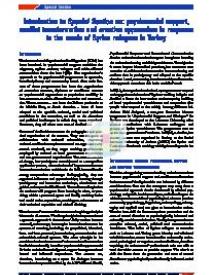Introduction to Special Section on : Psychosocial support, conflict transformation and creative approaches in response to the needs of Syrian refugees in Turkey
The International Organization for Migration (IOM) has been involved in psychosocial support activities for migrants, asylum seekers, refugees and crisis-affected communities since the late 1990s. The organisation’s approach to its psychosocial programmes is systemic, interdisciplinary and community based. One main feature of these programmes has been the organisation of executive masters, diploma or certificate courses on psychosocial approaches to population mobility in low-resource or crisis-affected countries and communities.
These courses − run from the Balkan peninsula to the Middle East, to South America − have all been adapted to the specific cultural, social and political conditions in the countries, as well as the situations and political landscapes in which they were organised. However, they all share two sets of similarities.
The Editorial Board of Intervention has seen the importance of supporting fieldworkers to showcase their work and demonstrate the potential of creative, theatrical and oral history processes and tools in the field of psychosocial support.
These reports are all small case studies, written by Schininà and Tankink: Introduction to special section 162 Intervention, Journal of Mental Health and Psychosocial Support in Conflict Affected Areas ¦ Volume 16 ¦ Issue 2 ¦ July 2018 [Downloaded free from http://www.interventionjournal.org on Tuesday, December 11, 2018, IP: 10.232.74.23] students, and with them the Intervention’s aim is to qualitatively highlight the aspects of feasibility and open our readership to the experiences of creativity as a way of expressing the unspeakable in safety. These field reports also remind all of us that play and culture, as well as conflict transformation, are the important elements of resilience.
In: Intervention: Journal of Mental Health and Psychosocial Support in Conflict Affected Areas, ISSN 1571-8883 | 16 | 2 | 161-163
http://doi.org/10.4103/INTV.INTV_36_18


